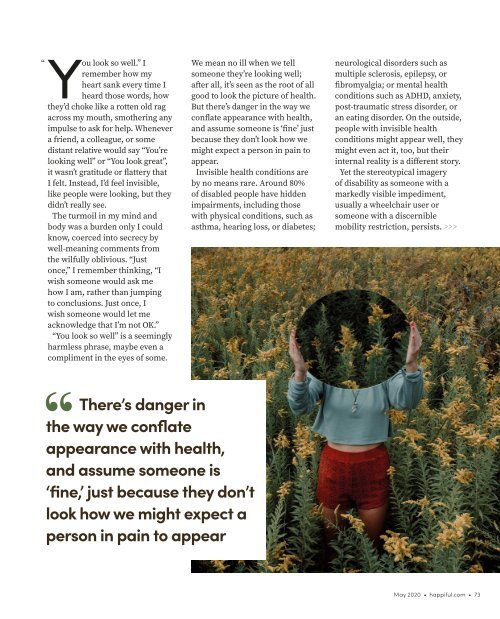Create successful ePaper yourself
Turn your PDF publications into a flip-book with our unique Google optimized e-Paper software.
“<br />
You look so well.” I<br />
remember how my<br />
heart sank every time I<br />
heard those words, how<br />
they’d choke like a rotten old rag<br />
across my mouth, smothering any<br />
impulse to ask for help. Whenever<br />
a friend, a colleague, or some<br />
distant relative would say “You’re<br />
looking well” or “You look great”,<br />
it wasn’t gratitude or flattery that<br />
I felt. Instead, I’d feel invisible,<br />
like people were looking, but they<br />
didn’t really see.<br />
The turmoil in my mind and<br />
body was a burden only I could<br />
know, coerced into secrecy by<br />
well-meaning comments from<br />
the wilfully oblivious. “Just<br />
once,” I remember thinking, “I<br />
wish someone would ask me<br />
how I am, rather than jumping<br />
to conclusions. Just once, I<br />
wish someone would let me<br />
acknowledge that I’m not OK.”<br />
“You look so well” is a seemingly<br />
harmless phrase, maybe even a<br />
compliment in the eyes of some.<br />
We mean no ill when we tell<br />
someone they’re looking well;<br />
after all, it’s seen as the root of all<br />
good to look the picture of health.<br />
But there’s danger in the way we<br />
conflate appearance with health,<br />
and assume someone is ‘fine’ just<br />
because they don’t look how we<br />
might expect a person in pain to<br />
appear.<br />
Invisible health conditions are<br />
by no means rare. Around 80%<br />
of disabled people have hidden<br />
impairments, including those<br />
with physical conditions, such as<br />
asthma, hearing loss, or diabetes;<br />
neurological disorders such as<br />
multiple sclerosis, epilepsy, or<br />
fibromyalgia; or mental health<br />
conditions such as ADHD, anxiety,<br />
post-traumatic stress disorder, or<br />
an eating disorder. On the outside,<br />
people with invisible health<br />
conditions might appear well, they<br />
might even act it, too, but their<br />
internal reality is a different story.<br />
Yet the stereotypical imagery<br />
of disability as someone with a<br />
markedly visible impediment,<br />
usually a wheelchair user or<br />
someone with a discernible<br />
mobility restriction, persists. >>><br />
There’s danger in<br />
the way we conflate<br />
appearance with health,<br />
and assume someone is<br />
‘fine,’ just because they don’t<br />
look how we might expect a<br />
person in pain to appear<br />
<strong>May</strong> <strong>2020</strong> • happiful.com • 73

















